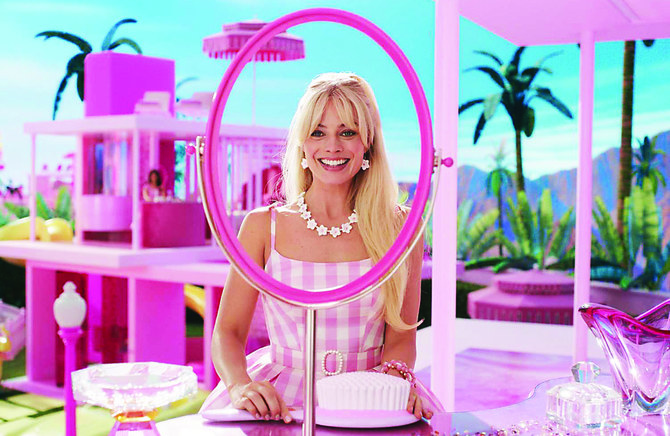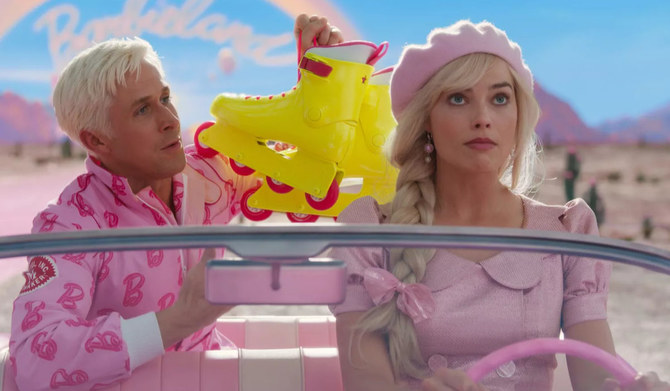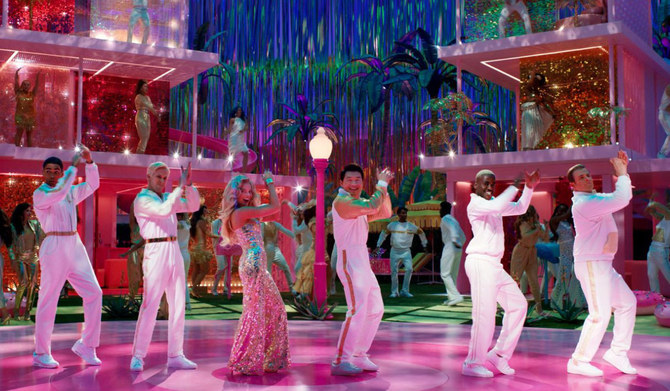RIYADH: People have been rushing to cinemas here to watch “Barbie,” the movie that has garnered $1 billion at the US box office but also caused a storm of criticism, particularly from people and governments in the Middle East.
Last Thursday, on the opening day in Riyadh, movie goers descended on cinemas wearing various shades of pink and their funkiest accessories, demonstrating how the popularity of the film has affected local audiences.
Kuwait has banned “Barbie,” while there is heated debate underway in Lebanon on whether to do so. Concerns have been raised across the region about the movie’s supposed disruption of cultural norms.
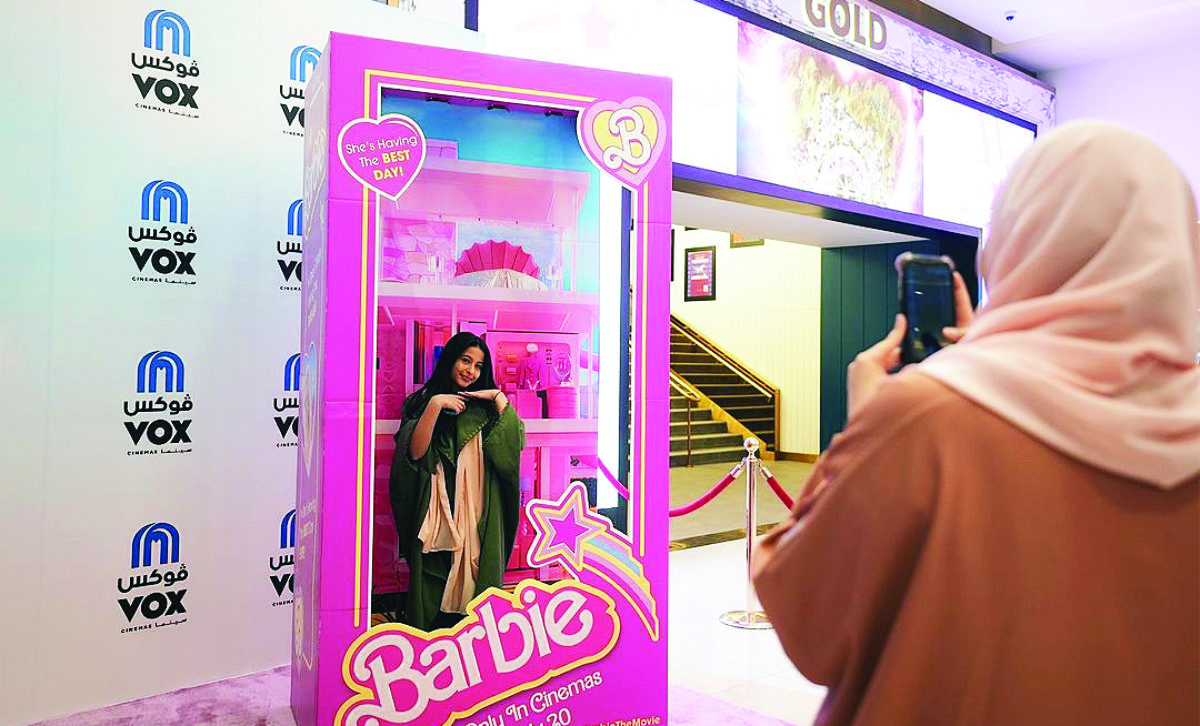
Pink Night at Riyadh Front drew crowds in pink, ready to embark on the ‘Barbie’ cinematic experience. (Instagram/voxcinemasksa)
Rumors had been circulating that Saudi Arabia would also prohibit the film when its screening was pushed to Aug. 31 — a month after its US release. But the film, starring Margot Robbie and Ryan Gosling as Barbie and Ken respectively, was unexpectedly released on Aug. 10, with only a few days’ notice given for advanced ticket purchases.
Some also rushed to criticism.
The movie is essentially about the tribulations of a woman in the “real world,” but individuals across the Arab region have been bashing the film, claiming it is packed with extreme feminist ideologies that degrade men. Many also claimed it violated traditional family values.
On Aug. 10, one person shared a post on X that stated: “Honestly, whoever is booking, I assure you you’ll regret it and won’t finish the film. You’ll just be wasting your weekend.”
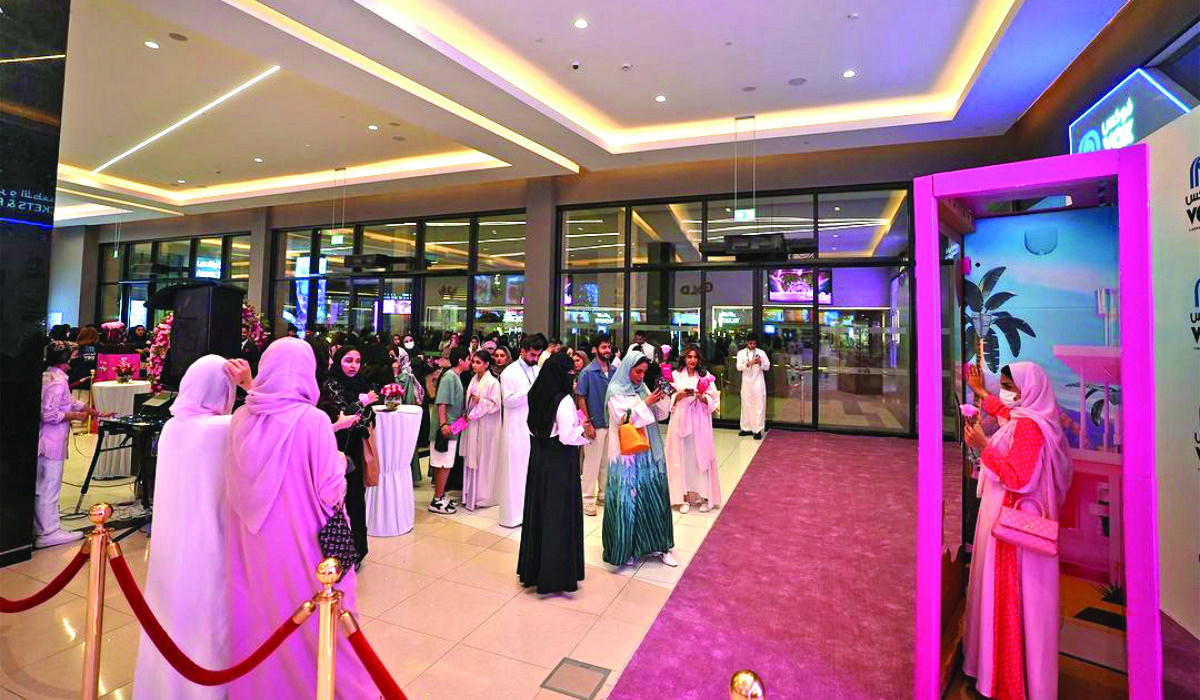
Pink Night at Riyadh Front drew crowds in pink, ready to embark on the ‘Barbie’ cinematic experience. (Instagram/voxcinemasksa)
The film’s marketing campaign, reportedly costing a whopping $150 million, has left no commercial area free of the signature Barbie color — from clothing and makeup collaborations, to pink-coated desserts and tourist initiatives, which includes Airbnb listing Barbie’s Malibu Dream House for bookings.
For weeks “Barbie” has gone viral on social media platforms. Saudi movie goers have also weighed in with their views.
Mohammed F. told Arab News that the film’s strong point is that it tackles issues such as patriarchal attitudes and consumerism, in playful and fun ways, using Barbie dolls.
I enjoyed it for what it was and it was definitely funny but the movie did not bring anything new to the table when tackling feminism.
Nora Al-sadoon, Moviegoer
“It’s very educational especially for women who don’t realize or have a clear understanding on why unfortunately a lot of men with privilege abuse their rights and basically how the current reality — patriarchy — affects women’s growth and dreams and aspirations to accomplish greatness,” he added.
In the film, there are Barbies with careers traditionally taken up by men, like doctors, astronauts and construction workers, but central to the plot is a stereotypical Barbie still trying to find her place in the world.
Mohammed continued: “I think that also speaks to women who are currently objectified and put in a box, to then realize how important it is to find themselves.

Mattel’s Margot Robbie Barbie doll. (Supplied)
“I believe men should definitely learn from this movie especially men who are toxic and objectify women because they are unfortunately the ones who find this movie controversial because they feel attacked by the truth they know is real.”
Many applauded the technical aspects and script of the film, which include lavish wardrobes, elaborate set designs, catchy soundtrack, and witty zingers in the all-so-pink world of Barbie Land.
For some women, it was the movie they have been waiting for because it appeared to represent their transition from innocent young girls to women facing the reality of contemporary society.
“It brought back so many precious childhood memories,” Mashael Abdulrahman told Arab News.
“What touched me the most was that it was about experiencing life, specifically through different human emotions. In several scenes I was left speechless, the way Barbie was trying to make sense of what she’s going through, how she was on a journey to self-discovery, understanding what does she truly want. And Ken too,” Abdulrahman explained.
For some, the storyline fell flat. “It just wasn’t very good,” said one woman who preferred to remain anonymous. While it flipped the idea of patriarchy on its head, she believes it did not go much further than that.
“Mostly I felt like it was a beautiful movie that was poorly made. Some parts felt rushed or unnecessary … But generally I felt like (it was) a modern blockbuster in the sense that it was a movie about an IP (a company’s intellectual property), trying to revitalize its image, and a director trying to break into making large blockbuster films. There were plenty of parts that were fun and funny but I don’t think it’s a breakthrough film,” the woman added.
Nora Al-Sadoon, who also watched the film, told Arab News: “Personally, I walked into it expecting a slightly more serious movie. I did like how it talked about Barbie presenting the dream for girls and them being anything they want to be, but the script and the story felt a little weak. I enjoyed it for what it was and it was definitely funny but the movie did not bring anything new to the table when tackling feminism.”
Some said that they expected more from Greta Gerwig, the actress, director, and screenwriter behind the critically-acclaimed films “Little Women” and “Ladybird.”
Abdullah Faisal said that he “resonated with some moments of the movie, yet given who worked on this movie, it wasn’t as strong or impactful as I expected it to be. For major topics like patriarchy and gender discrimination, the movie didn’t give them justice.”
Aside from gender, Faisal said the film seems to have highlighted generational differences in his family on certain issues. While his 37-year-old sister felt connected to the themes as a Saudi woman facing various societal challenges, his mother expressed a dislike for the film. “She said it had great messages but nothing new or emotionally provocative,” he explained.


